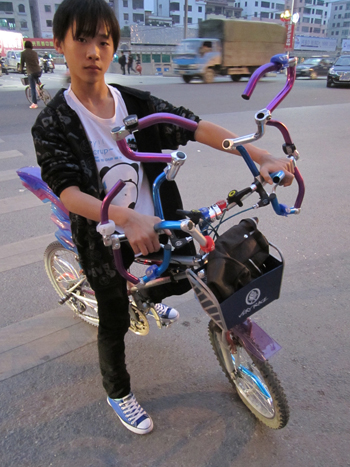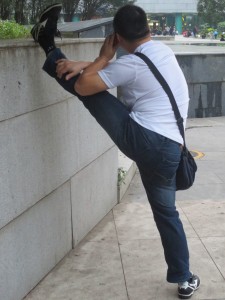- Details
" />
About Us
About Us
Hi, my name is Cecilie and I'm a Cantonese fundamentalist, meaning I aim to put the FUN back in MENTAL.
I have been working tirelessly for many years to put Cantonese where it belongs: On top of the linguistic food chain. Yes, I want full world domination (supremacy) for Cantonese, while of course allowing the other languages to live too.
To achieve this not unreasonable goal, I do hand-to-hand language instruction for groups and individuals, I make Cantonese instruction videos and film documentaries from Hong Kong and mainland China, I write articles for South China Morning Post and I write books. I make podcasts for RTHK and for my own channel, and I do a little blogging in my spare time.
Oh, and I arrange dinner parties and cook Sichuan food on my roof overlooking the South China Sea.
Canto forever! Cantonese rules!
Cecilie (pronounced 'Cecilia' - NOT Cecile!)

Search
Products
-
 Chillies! Sichuan food made easy
$8.00
Chillies! Sichuan food made easy
$8.00 -
 Stay Grounded
$14.00
Stay Grounded
$14.00 -
 Special: Going Native and Cantonese - The Movie
$25.00
Special: Going Native and Cantonese - The Movie
$25.00 -
 Going Native
$17.00
Going Native
$17.00 -
 Cantonese - The Movie
$14.00
Cantonese - The Movie
$14.00
Tags
- No products in the basket.
- Details
Cantonese, Beauty, Great Food … all a short bus ride away
Why fiddle around with airport security, hours in taxis to and from airports, being in a place with only other tourists and leaving gigantic carbon footprints every time you go even on a weekend trip →
Today’s Expression: 霧 (including Today’s Weather Condition)
嘩!今日好大霧呀。Wah! Gam yat hou daai mou ah. (“Wow! Today well big fog ah”) – My but it’s foggy today. Oh, and if you’re surprised that it’s foggy, you could say: 咦?咁大霧嘅? Yi? Gam daai mou geh? →
New Feature: Guerrilla Cantonese!!!!
Do you want to learn some survival or day-to-day Cantonese but can’t commit to regular, weekly sessions because you’re just too damn busy or simply can’t be arsed? Guerrilla Cantonese may be the answer for you. Guerrilla means: →
Today’s Classifier: 個
四個四川人 – sei go sei chyun yan →
Learn Cantonese the Natural Way –
– from a Norwegian! A glimpse behind the scenes of Happy Jellyfish People’s Democratic Language Bureau:
AT LAST! Mac has joined the normal world
Joy to the world, my life is complete. For ages I’ve been writing Chinese characters in the worst way invented by man; by typing the words in pinyin, in other words Mandarin, imperialist communist speech-language. →
New Victory For Client
I just received this from one of my victims, Elise Lefebvre: “Yesterday night, I was invited for dinner at a Chinese friend’s place for what seemed to be the last of the Chinese/lunar new year →
Today’s Classifier: 條
一條路 (Yat tiu lou) (one stick of road.) Well, footpath really, but you get my little driftie. Yeah, I love 條。It’s the classifier for long and thin, bendable or bending things, like a river: 一條河 →
Today’s Classifier: 張
一 張相 (yat jeung seung) (a sheet of photo.) Flat, rectangular things have the classifier 張。Also things that in the past have been flat and rectangular, like a sofa, (used to be a bench) →
- Details
Learn Cantonese This Year
You know, you don’t have to commit to a whole awful hour a week. No, you can take Happy Jellyfish People’s Democratic Language Bureau’s three hour crash course! Perhaps even a crash course sounds too →
Cantonese Crash Curse. I Mean Course.
Wei wei, Friday night it’s full forge ahead again with Happy Jellyfish People’s Democratic Language Bureau’s Cantonese FUNdaMENTAList Crash Course!!!! You’ll learn everything you need to know about drinking in bars, paying for drinks and →
So Many Ways To Learn Canto!
As imperial-Mando encroaches on our linguistic liberties, it goes without saying that more and more people who don’t like to be dictated to, want to learn Cantonese. But many are concerned about time, commitment, pain, →
Guerrilla/Crash Course this Saturday
You know you want to learn Cantonese without really trying! Well, this Saturday, in only 3 short hours you can learn everything you need to kick-start your Canto career. I’ll give you all the tricks →
Guerrilla Cantonese This Saturday !!!!!
I’ve got a couple of beginners ready to take a three hour crash course in the noble art of “Ordering Stuff in a Restaurant or Bar in Excellent Cantonese.” I know that most people visiting →
- Details
Change
I needed an excuse to publish this photo. It was taken in Shenzhen (naturally) in what used to be an excellent little forest just across the square from the train station but which is now shaved down to the bare trunks. People probably got up to all sorts in that little forest
And it was in Shenzhen the other day that I had an epiphany. No, that’s not right. I should say, another reminder of how deeply different from English the Cantonese language is.
In my lessons I often use the example of ‘take’ to illustrate this. In Chinese, take medicine, take someone to a party, take a taxi and take that you bastard! are all different words. Why? Because they have completely different meanings! If you tried to take a taxi like you take medicine, there’d be one hell of a kerfuffle! You’d wear your teeth (or arse) down and the lacquer would quickly rust.
Take. When you think about it, is it natural to use one word to describe about 200 vastly different actions?

I hadn’t thought of ‘take’ for a while when I went to Shenzhen to pick up two pairs of shorts. But next to my tailor’s I saw a sign that made me think deeply about English again. It said in English ‘Change Shirt’. (改衫 goi saam) Yes! 改 does mean change and 衫, I suppose, ‘shirt’. (But in Cantonese it normally means ‘clothes’). So was it a changing room where people could change out of their old and awful shirts/clothes? No, it meant ‘alterations’.
Change is change, right? Wrong. Change money, change trains, change into not the man I married, change direction, keep the change – all vastly different in Chinese because of the different meaning. That’s important to keep in mind. But will you? Or will you insist on Chinese changing to become more like English?
By the way, my Cantonese course has slightly changed direction! I’m now doing lessons on Skype.
Contact us today
Email info@learncantonese.com.hk
to find out how you can start learning Cantonese.


